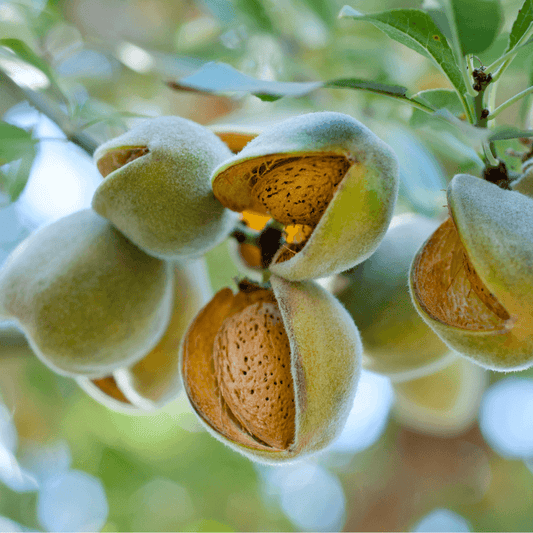Collection: Fragrant blooms, rich harvests, almond trees that love the heat
The almond nut tree (Prunus dulcis), also known in some regions as the tree of badam, is a beautiful and rewarding choice for any home orchard. A member of the stone fruits family, the almond tree is prized for its fragrant spring blossoms and nutritious nuts.
Perfect for Mediterranean climates, almond trees thrive in areas with mild wet winters and hot, dry summers—ideally in USDA zones 7–9. At Grow Organic, we offer high-quality almond trees, including the popular All-in-One Almond Tree—a self-pollinating, drought tolerant, hardy almond variety on Viking rootstock. These trees grow 15–20 feet tall, love full sun, and typically produce nuts in 3–4 years.
Choosing the Right Almond Tree for Your Garden
Our All-in-One Almond Tree is ideal for home growers:
- Self-pollinating (no need for cross pollination, though additional trees may boost yields)
- Adaptable to well-drained soil and different climates
- Blooms in early spring, one of the first fruit trees to flower
- Begins almond production within 3–4 years
- Grafted to Viking rootstock for vigor, pest resistance, and consistent performance
Read our guide to growing potted fruit and nut trees to learn more.
Almond Varieties: Sweet vs. Bitter Almonds
When selecting an almond tree, it's important to know the difference between sweet almonds and bitter almonds:
-
Sweet almond varieties are edible and used for snacking, baking, and cooking
-
Bitter almonds contain trace amounts of amygdalin and are used to make almond flavoring or extract
Explore the benefits in Go Nuts with Almonds.
Growing Conditions and Almond Production
To successfully grow almond trees:
-
-
Choose a planting site with full sun and well-drained soil
-
Ensure your location falls within the proper hardiness zone
-
Water regularly during nut development; mature trees are drought tolerant
-
Protect early blossoms from frost, especially in early spring
Almond Trees from Grow Organic
Whether you're adding one almond plant or building a complete fruit tree collection, our almond trees offer strong growth, adaptability, and delicious results. With Viking rootstock and reliable genetics, our trees are perfect for growing your own homegrown almonds.
Order your almond tree today—whether you call it an almond tree or the tree of badam, it's a beautiful way to enjoy years of harvest and flavor.
 Sold out
Sold out